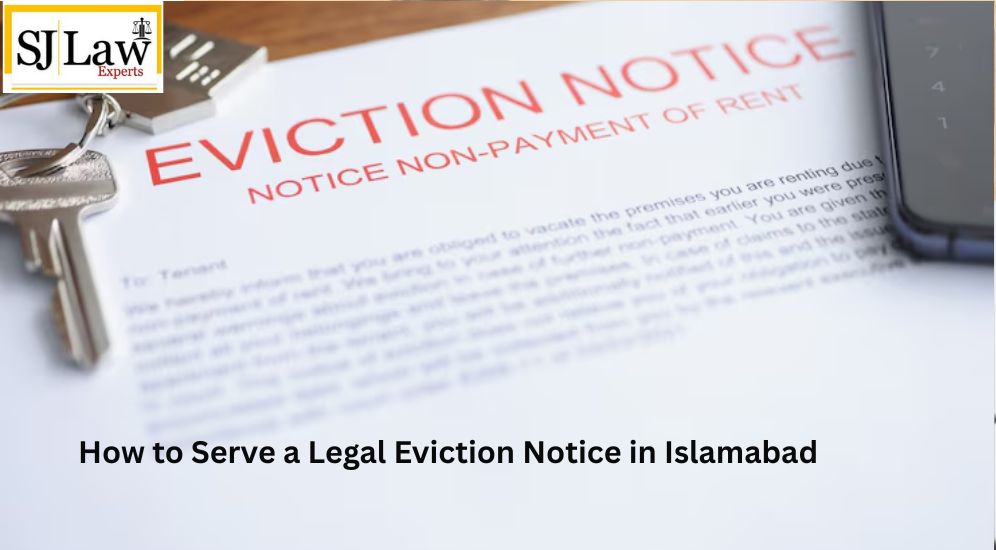When it comes to landlord-tenant disputes in Islamabad, one of the most crucial steps in regaining control of a property is to serve a legal eviction notice. In Pakistan, tenancy laws vary by region, and in Islamabad, they are primarily governed by the ICT Rent Restriction Ordinance, 2001. Serving a legal eviction notice in compliance with this law is mandatory for any legal proceedings regarding tenant eviction.
Below, we provide a comprehensive guide to legally and effectively serving an eviction notice in Islamabad, covering all legal procedures, required documentation, and best practices to avoid future legal hurdles.
Understanding the Legal Grounds for Eviction in Islamabad
Before a landlord can initiate the eviction process, it’s essential to understand the valid legal grounds on which a tenant may be evicted. According to Section 17 of the ICT Rent Restriction Ordinance, 2001, eviction can be initiated on the following grounds:
- Non-payment of rent within the stipulated period
- Subletting without the landlord’s consent
- Violation of terms and conditions of the rental agreement
- Use of premises for illegal or unauthorized purposes
- Personal use of the property by the landlord
- Need for major renovation or reconstruction
- Expiry of lease agreement without renewal
Proper documentation and evidence supporting any of the above grounds are vital when drafting the legal notice.
Step-by-Step Guide to Serving a Legal Eviction Notice in Islamabad
1. Drafting the Eviction Notice
The first step is to draft a written eviction notice. This notice should be:
- In writing, preferably on a legal firm’s letterhead
- Signed by the landlord or legal representative
- Clearly stating the reason for eviction
- Specifying the time frame (minimum 15 days as per the Ordinance)
- Including rental details (agreement copy, payment history, and violation if any)
The language must be clear, formal, and legally accurate. Ambiguous or emotionally charged language can weaken the landlord’s case in court.
2. Legal Format of the Eviction Notice
The eviction notice must include the following key components:
- Full name and address of both the landlord and the tenant
- Description of the property in question
- Tenancy start and end dates
- Grounds for eviction (non-payment, subletting, etc.)
- Deadline for vacating the premises
- Mention of possible legal action upon non-compliance
It is strongly recommended that the eviction notice be reviewed by a qualified legal practitioner to ensure compliance with the ICT Rent Restriction Ordinance.
3. Modes of Serving the Notice
In Islamabad, the eviction notice must be served formally and documented for legal validation. There are several acceptable ways to serve the notice:
Registered Post (Acknowledgement Due)
Sending the notice via registered mail with acknowledgment due (AD) is the most legally secure method. The return receipt serves as proof that the notice was received by the tenant.
Personal Delivery
The landlord or representative can personally deliver the notice, ideally in the presence of a witness. The tenant should sign a copy of the notice acknowledging receipt.
Through Legal Counsel
In more complex situations, the notice may be served through an attorney. This approach adds legal weight and ensures that the notice is properly framed and delivered.
4. Waiting Period After Serving the Notice
Under the law, a minimum of 15 days must be given to the tenant to vacate the premises. This time may be extended depending on the terms of the tenancy contract or mutual understanding.
It is crucial not to attempt any forced eviction during this period. Any coercive action by the landlord can lead to criminal liability.
5. Filing an Ejectment Petition
If the tenant refuses to vacate the premises even after the notice period expires, the landlord may proceed to file an ejectment petition in the Rent Controller Court of Islamabad.
Documents Required for Filing:
- Copy of eviction notice
- Proof of service (registered AD receipt or tenant’s acknowledgment)
- Copy of tenancy agreement
- Evidence of rent default or other violations
- CNIC copies of landlord and tenant
- Ownership documents (e.g., Fard, registry, or sale deed)
The court will summon both parties and conduct a hearing. If the tenant has no legal defense, the court may pass an ejectment order.
6. Court Proceedings and Timeline
Once the ejectment petition is filed:
- The court issues a summon to the tenant.
- The tenant has 15 days to respond.
- A hearing is conducted, and both parties are allowed to present their evidence.
- If the court rules in the landlord’s favor, it issues an ejectment order.
The average time for this legal process may range from 2 to 6 months, depending on the complexity of the case and the court’s schedule.
7. Execution of the Ejectment Order
If the tenant fails to vacate the premises after the court’s order, the landlord can file for execution of the decree.
The Rent Controller may direct the bailiff to evict the tenant, often in the presence of local police. The landlord must not attempt eviction personally under any circumstances.
8. Precautionary Measures for Landlords
To avoid legal complications, landlords should:
- Always sign a written tenancy agreement registered with the Rent Controller
- Clearly define the tenancy duration and terms
- Issue receipts for all rent payments
- Conduct a police verification of the tenant
- Avoid verbal agreements or unregistered contracts
Proper documentation and legal compliance are the keys to a smooth eviction process.
📞 Contact SJ Law Experts Today
Trust SJ Law Experts to handle your case with professionalism, empathy, and precision.
📌 Schedule Your Legal Consultation:
📱 WhatsApp/Phone: +92 (0) 335-411-2288
📧 Email: SJLawExperts@gmail.com
📍 Office: No. 1, First Floor, Al Anayat Mall, Above Faysal Bank, G-11 Markaz, Islamabad, Pakistan
9. Legal Assistance and Representation
Due to the legal complexities involved in eviction procedures, it is recommended that landlords hire a qualified property lawyer. Legal professionals ensure that:
- Notices are properly worded
- Procedures are followed correctly
- Representation in Rent Controller Court is effective
- Rights are protected throughout the process
Conclusion
Serving a legal eviction notice in Islamabad involves detailed legal compliance, from proper documentation to formal notice delivery and potential court proceedings. Whether you’re dealing with a defaulting tenant, subletting issue, or need the property for personal use, following the ICT Rent Restriction Ordinance, 2001 precisely ensures that the landlord’s rights are upheld without violating the tenant’s legal protections.





